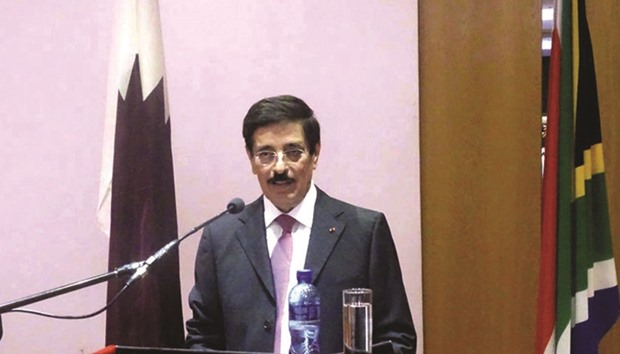HE the Adviser at the Emiri Diwan and the State of Qatar’s candidate to the post of the Director-General of the United Nations Educational, Scientific and Cultural Organisation (Unesco), Dr Hamad bin Abdulaziz al-Kuwari has stressed that diverse higher education contributes greatly to developing a mind that employs critical thinking.
He said it allows graduates to personally be able to distinguish between that which is resolutely good and that which is inherently bad, and encourages people not to become victims of “thinking by proxy”, which embodies the current mindset among ignorant, violent extremists.
Addressing the “Mediterranean Universities Union” at the University of La Sapienza in Rome on the occasion of marking the 25th anniversary of the establishment of the Union, HE al-Kuwari called on teachers and academics to establish proper educational policies and enhance moral education in order to prevent the rise of extremism, noting that a number of extremist leaders in the world were once students in important and large universities in vital areas of the globe where the absence of fostering true values of human kindness has led to the predomination of technicality over innate values, and indoctrination over critical thought processes.
This system-wide neglect calls for a reform in overall curriculum through modernisation, with a greater focus on the common values of tolerance, rejection of intolerance and furthering respect for others, he added.
Unesco is inevitably facing a great variety of global challenges that reflect the strong need for new ideas from an aspiring new generation that will be able to step up to the current challenges, he explained.
The ignorant hands that have destroyed heritage sites in Iraq, Syria, Libya, Afghanistan and Timbuktu are the result of an educational system that has failed to produce enlightened minds and knowledgeable citizens; instead it has, unfortunately, “dropped the ball” in this regard and has produced a number of destructive and extremist minds and thoughts, Dr al-Kuwari said.
“It is the resolute right of every academic to be closer today, more than ever before, to the Unesco, to express their concerns that count for all of humanity and provide alternative solutions to the plethora of problems the world is currently dealing with, and there is no one better suited than the people I see before me to evaluate the on-going seriousness of this phase and no one better than them to formulate new ideas and projects, within the university environment which is, in its own right, a real laboratory of ideas, a home for growth of human consciousness and a wellspring of new creativity and future innovation,” he explained.
Dr al-Kuwari expressed admiration for Mediterranean Universities Union’s regional initiative that studies the specific needs of university graduates and seeks to meet their aspirations in accordance with the requirements and the variety of trends of the current global labour market, praising the conference it organised related to employing university graduates in the creative industries sector.
In this regard, al-Kuwari noted that he dedicated an entire chapter in his book “Global Majlis” towards the same issues, and he oversaw several international conferences to further draw attention to this globally important cause when he was president of the Organisation of the United Nations Conference on Trade and Development (UNCTAD).
‘’No one disagrees that Unesco is facing a serious financial crisis that requires creative proposals in order to deal with it’’, al-Kuwari said, stressing that the support of many Gulf, Arab, European and Asian countries and others they have provided for the Unesco during its successful, transitional path, and despite all the difficulties it has faced, which have enabled it to achieve a great part of its imperative objectives since its original inception.
Unesco is in need of a fresh new momentum that should be characterised by creativity in its approach, creativity that will enable it to deal with on-going developments that hinder the better performance its work as necessary and required, he said, stressing that the organisation should be once again introduced to the world with its clearly defined objectives and goals then the international community will realise its important role, now more than ever, to sow peace in human minds.

HE Dr Hamad bin Abdulaziz al-Kuwari
